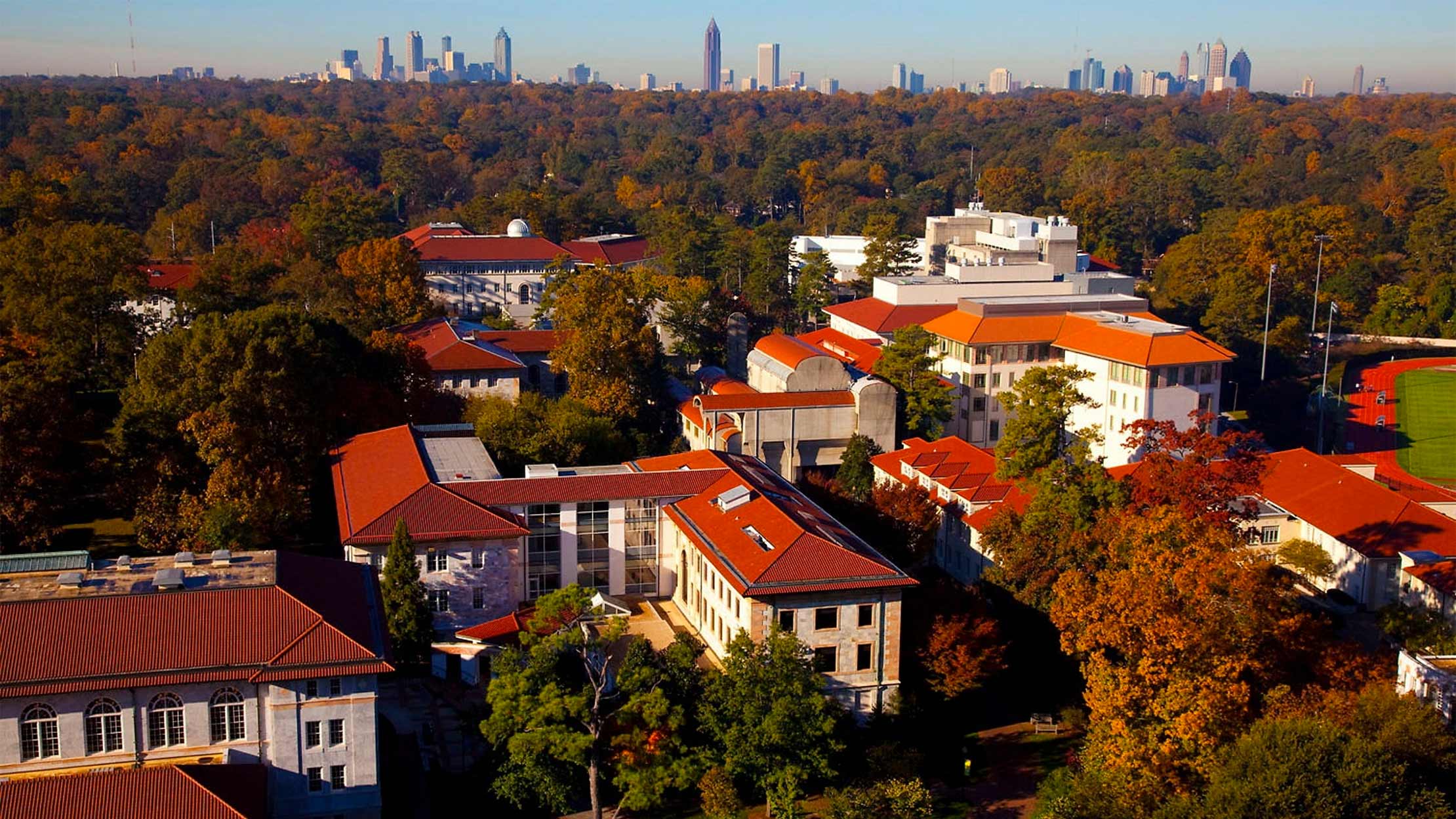
Economic Impact
In addition to its strong cultural influence, alumni leadership, and academic strengths, Emory has a profound economic impact upon metro Atlanta—$14.8 billion in 2019—as we create thousands of jobs, generate millions in tax revenues, undertake capital investment, and contribute to communities through service, health care, research, and civic engagement.

As the largest employer in the greater Atlanta region, with a statewide workforce of 39,125, we directly and indirectly support more than 92,000 jobs statewide. Spending power comes with those jobs, as demonstrated by our employees and students, as well as the nearly five million patients and visitors each year whose purchases help fuel the regional economy. In the end, Georgia is stronger because of Emory.
And it's not just the university. Emory Healthcare has a major economic impact on the region through patient care, research, construction, teaching, and partnerships. In 2019, its economic impact within the state was $9.62 billion; the value of community benefits to improve the health care of Georgians totaled $688 million, with $151.5 million provided in charity care.
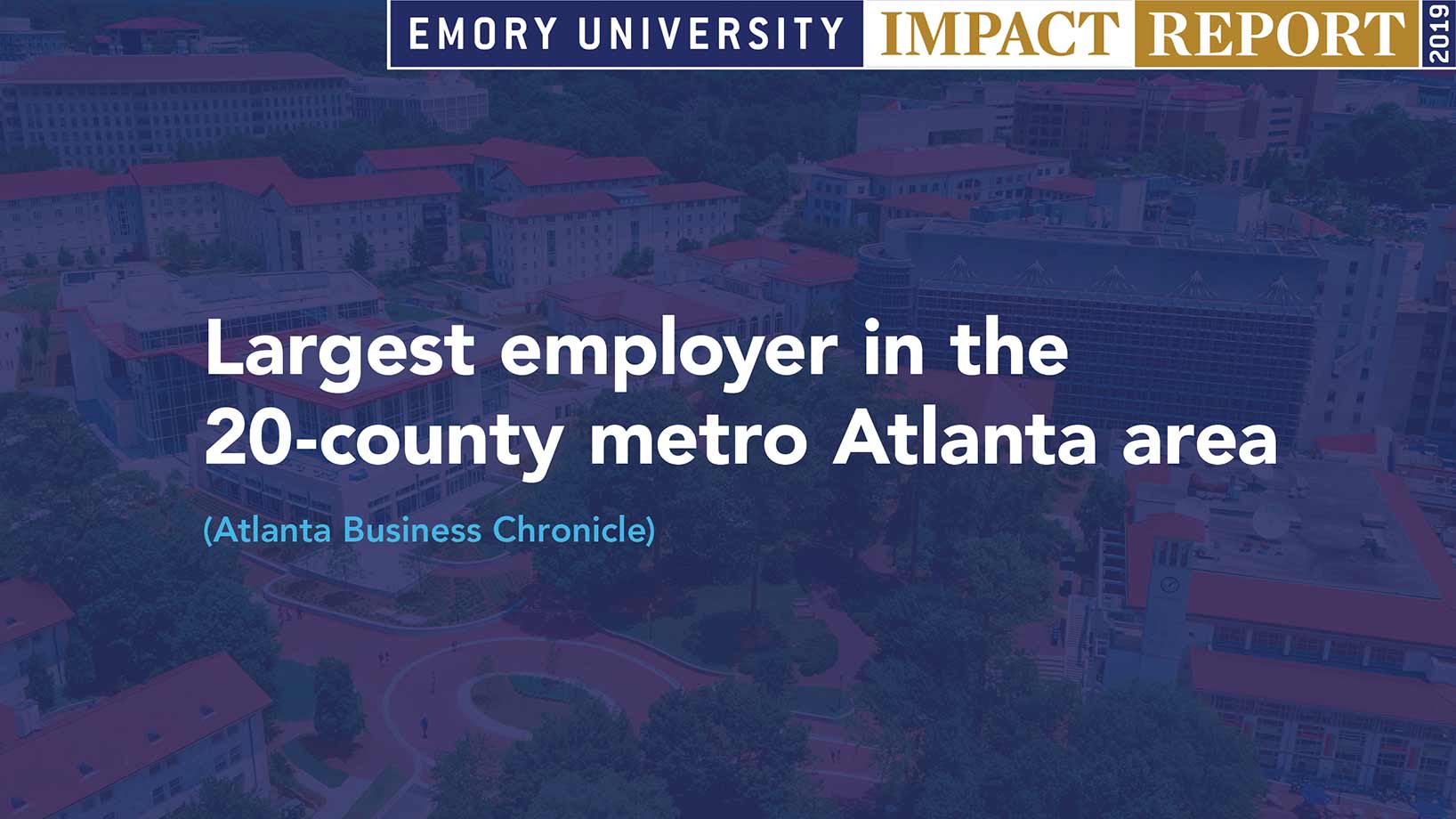
Together, Emory's investments in new construction—averaging $240 million per year since 2015—benefit local businesses and their employees. In the past six years, the university has undertaken $1.4 billion in capital projects.
And Emory helps support local and state government through sales and business taxes, delivering more than $254 million in state tax revenue annually.
Once students leave the university, the value of an Emory education accrues not just to our graduates but also to their communities. With ties to campus and community, graduates often stay in the region. Based on the number of alumni living and working locally, this yields an additional $402 million of household income within Atlanta and $942 million within the state—a benefit that keeps on giving.
Our Four Impact Areas
Emory's economic impact is felt in four major ways:
Operations
As an educational institution, health system, and research enterprise, Emory is a major employer and procurer of goods and services. Both roles support local economic activity. In fact, we consistently demonstrate our commitment to local purchasing and track vendor spending to locally owned businesses.
See our Operations Impact
Wage Premium
For alumni with a bachelor's degree, those living in the city of Atlanta earn an estimated $33,900 additionally each year, and alumni in the rest of the state earn an additional $26,700. Emory alumni with a master's degree earn an estimated wage premium of $26,000 in Atlanta and $25,300 in the state.
See our Earning Impact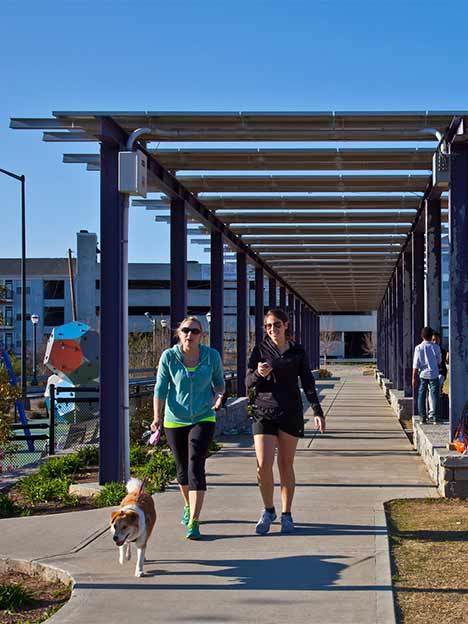
Capital Investments
Emory undertakes significant capital investments each year, including new buildings, major renovations, and maintenance projects. These investments support jobs, create demand for goods and services, and generate statewide tax revenues.
See our Capital Investments Impact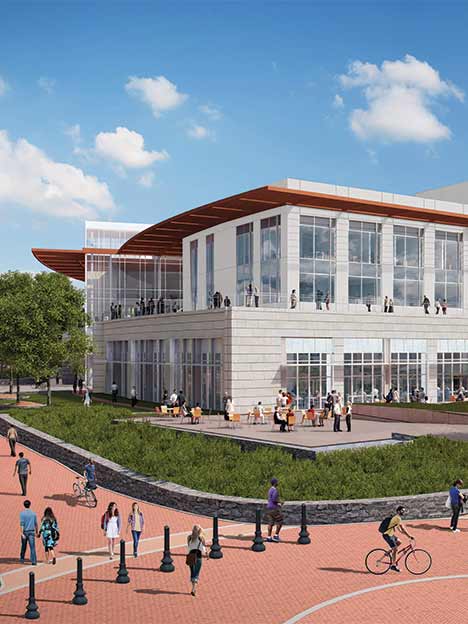
Ancillary Spending
Emory students account for the largest expenditures, being responsible for more than $267 million in ancillary spending each year. Their annual spending across a variety of categories, including food and retail, stimulates the local and statewide economy.
See our Spending Impact
Operations
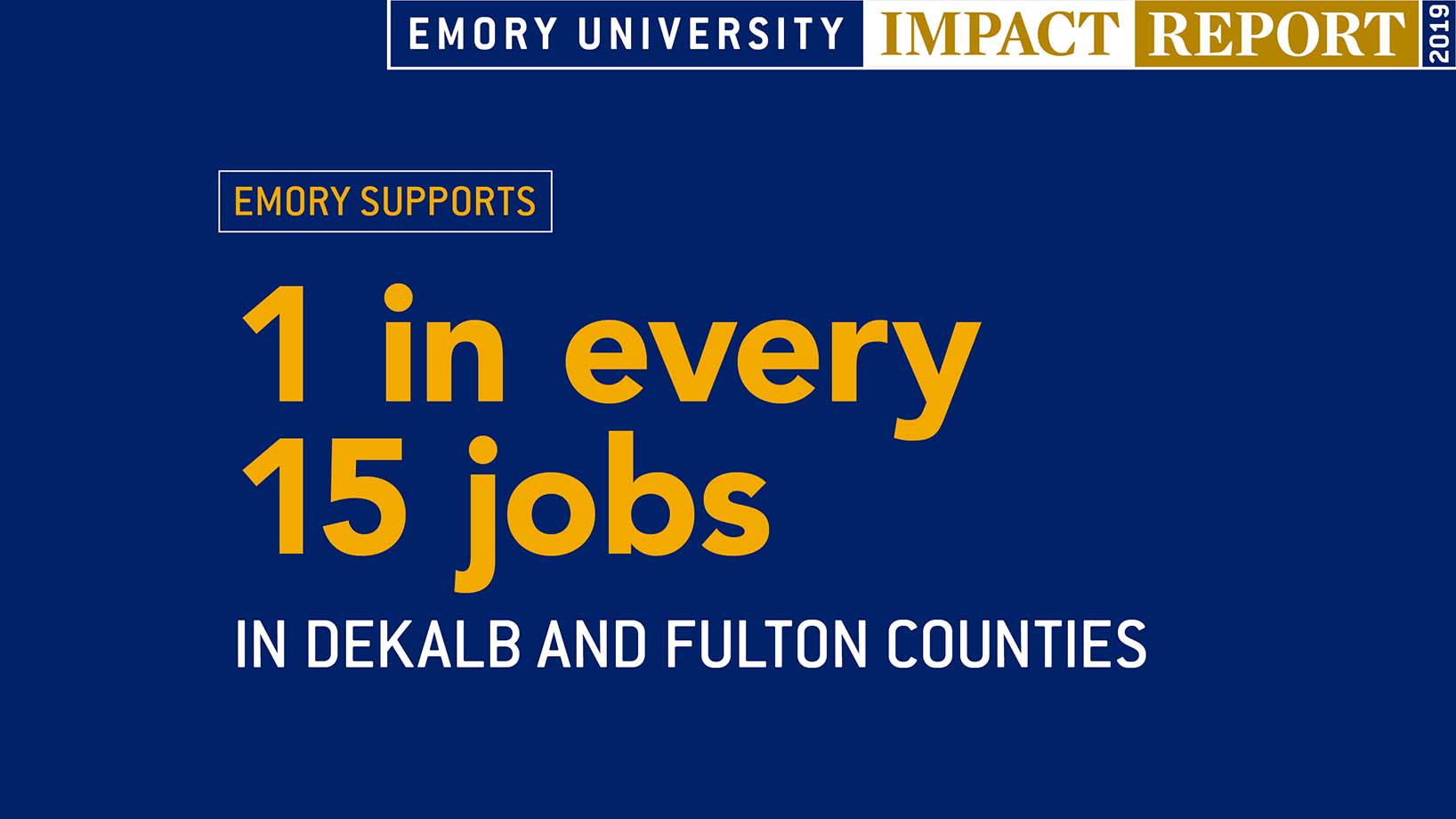
Emory’s most direct economic contribution is through its large and growing annual operations. Operations and payroll to employees support jobs and businesses within local and state economies. The university’s current budget is about $3.2 billion, and it directly employs 15,200 employees, while Emory Healthcare’s current budget is about $7.3 billion, with more than 24,400 employees.
As an educational institution, health system, and research enterprise, Emory is a major employer and procurer of goods and services. Both roles support local economic activity. In fact, we consistently demonstrate our commitment to local purchasing and track vendor spending to locally owned businesses.
The university’s operations produce:
- City of Atlanta: $2.17 billion in total output, supporting 17,900 direct, indirect, and induced jobs and $1.46 billion in earnings;
- Atlanta Metropolitan Statistical Area (a 30-county region): $3.39 billion in total output, supporting 25,000 direct, indirect, and induced jobs and $1.92 billion in earnings; and
- State of Georgia: $3.41 billion in total output, supporting 25,100 direct, indirect, and induced jobs and $1.93 billion in earnings.
Emory Healthcare’s operations produce:
- City of Atlanta: $4.11 billion in total output, supporting more than 26,700 direct, indirect, and induced jobs and $2.02 billion in earnings;
- Atlanta Metropolitan Statistical Area (a 30-county region): $9.24 billion in total output, supporting 54,200 direct, indirect, and induced jobs and $3.90 billion in earnings; and
- State of Georgia: $9.62 billion in total output, supporting more than 56,100 direct, indirect, and induced jobs and $4.01 billion in earnings.
Although Emory is a tax-exempt institution, its operations also create significant amounts of revenue for the city and state governments. The city of Atlanta does not levy income taxes, so Emory’s impact was analyzed only for sales and business tax revenue at the city level. Annually, Emory University and Emory Healthcare generate:
- City of Atlanta: $5.1 million in total tax revenue; and
- State of Georgia: $211.1 million in total tax revenue, including $167.2 million in personal income tax revenue.
Wage Premium
Emory has 153,000 alumni worldwide, of whom a significant portion—46,000—live in Georgia. Their higher income potential, by earning an Emory degree, infuses more spending into the state economy.
For alumni with a bachelor’s degree, those living in the city of Atlanta earn an estimated $33,900 additionally each year, and alumni in the rest of the state earn an additional $26,700. Emory alumni with a master’s degree earn an estimated wage premium of $26,000 in Atlanta and $25,300 in the state.
Economic impact of Emory's Wage Premium:
- City of Atlanta: $109 million in total output, supporting 800 induced jobs and $428 million in earnings;
- Atlanta Metropolitan Statistical Area (a 30-county region): $852 million in total output, supporting 5,600 induced jobs and $1.10 billion in earnings; and
- State of Georgia: $911 million in total output, supporting 6,100 induced jobs and $1.20 billion in earnings.
In addition, the tax revenue impact from Emory’s wage premium is significant. The economic activity attributable to the effects of the wage premium generates an estimated $400,000 in tax revenues within the city of Atlanta and $36 million in tax revenues within the state of Georgia on an annual basis.
Capital Investments
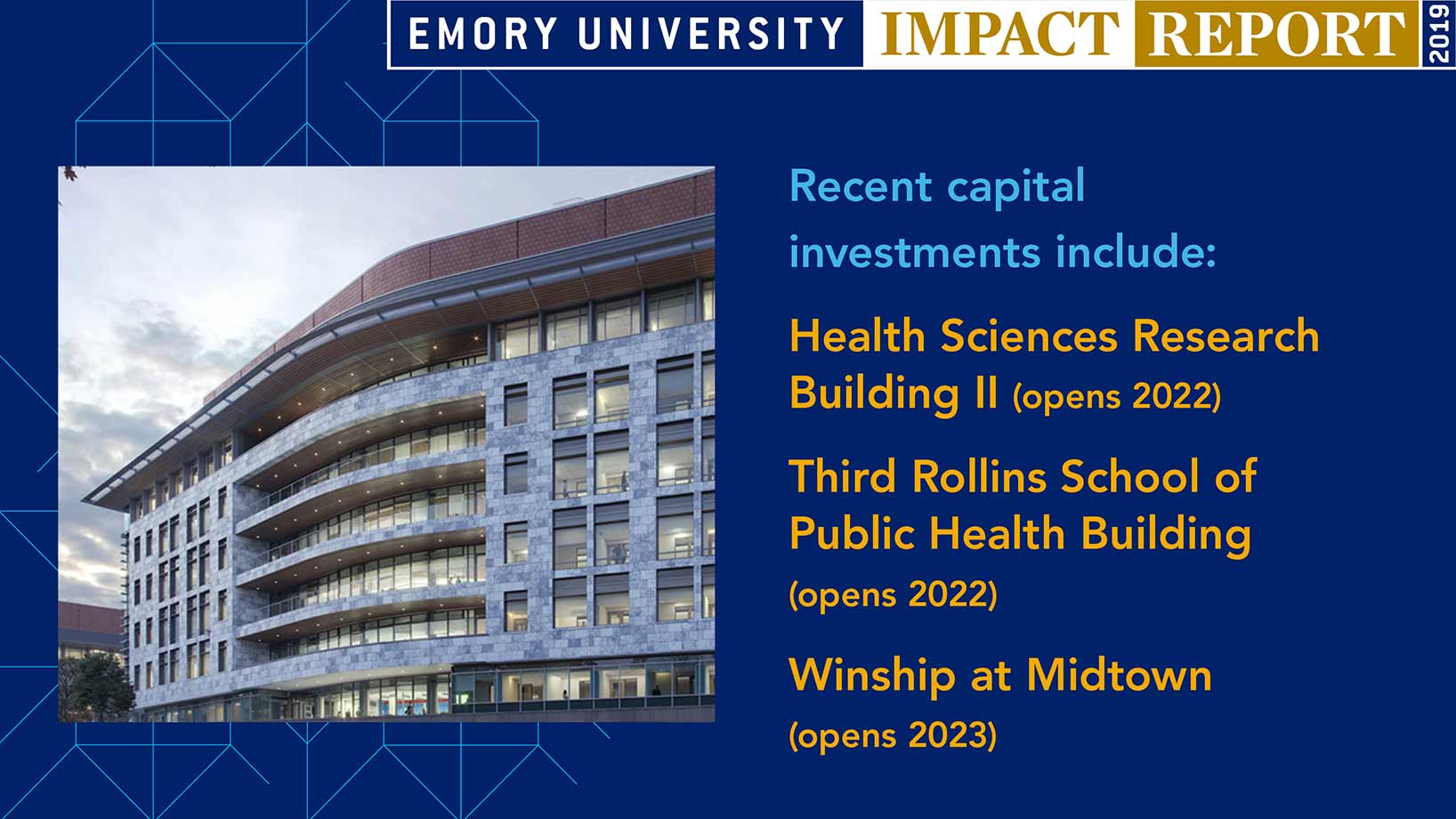
Emory University and Emory Healthcare undertake significant capital investments each year, including new buildings, major renovations, and maintenance projects. This spending supports jobs, creates demand for goods and services, and generates statewide tax revenues. More important, because the work is done sustainably, it helps make Emory a more vibrant community for students, patients, employees, and local residents. Additionally, third-party investors have spent about $12 million annually on real estate developments near Emory’s campus.
Economic impact of Emory's Capital Investments:
- City of Atlanta: $248 million in total output, supporting 1,400 direct, indirect, and induced jobs and $66 million in earnings;
- Atlanta Metropolitan Statistical Area (a 30-county region): $455 million in total output, supporting 2,500 direct, indirect, and induced jobs and $132 million in earnings; and
- State of Georgia: $462 million in total output, supporting 2,600 direct, indirect, and induced jobs and $133 million in earnings.
Further, Emory’s capital investments generate considerable tax revenue.
- City of Atlanta: $200,000 in total tax revenue, $100,000 in sales and use tax revenue, and another $100,000 in business tax revenue; and
- State of Georgia: $4.5 million in total tax revenue, including $2.8 million in income tax revenue, $1.4 million in sales and use tax revenue, and $200,000 in business tax revenue.
Ancillary Spending
Emory students account for the largest expenditures, being responsible for more than $267 million in ancillary spending each year. Their annual spending across a variety of categories, including food and retail, stimulates the local and statewide economy. The university also attracts roughly four million visitors and patients annually, whose spending on lodging, food, and retail stimulates the local and statewide economies. In total, visitors to Emory spend about $251 million each year within the state economy.
The chart below shows the economic effect of student and visitor spending at Emory University and patient spending at Emory Healthcare.
- City of Atlanta: $99 million in total output, supporting 900 direct, indirect, and induced jobs and $24 million in earnings;
- Atlanta Metropolitan Statistical Area (a 30-county region): $380 million in total output, supporting 2,900 direct, indirect, and induced jobs and $93 million in earnings; and
- State of Georgia: $386 million in total output, supporting 2,900 direct, indirect, and induced jobs and $94 million in earnings.
Tax revenue impact from Emory’s ancillary spending:
- City of Atlanta: $380,000 in total tax revenue, $250,000 in sales and use tax revenue, and another $140,000 in business tax revenue; and
- State of Georgia: $3.2 million in total tax revenue, including $2.0 million in income tax revenue, $1 million in sales and use tax revenue, and $170,000 in business tax revenue.
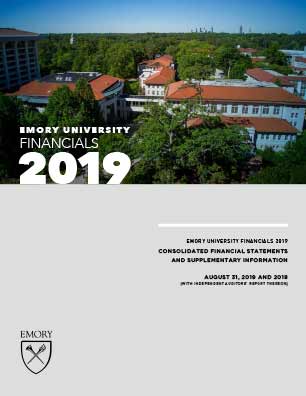
Emory University Financials 2019
Consolidated Financial Statements and Supplementary Information, August 31, 2019 and 2018 (PDF file)
Access statementThis report was prepared by Econsult Solutions and delivered to Emory University on January 23, 2020. It is an update of a December 2018 economic impact study prepared by Econsult; this 2019 update uses financial data inclusive of FY2019.
Scope and Methodology
Econsult uses IMPLAN, a standard input-output modeling technique to estimate the full range of economic, employment, and labor income impacts associated with the direct activity attributable to Emory. Econsult also has developed a custom fiscal impact model to translate this activity into any commensurate tax revenue impact.
In an interconnected economy, every dollar spent generates two spillover impacts. First, some proportion of the amount that purchases goods and services gets circulated back into an economy when those goods and services are purchased from local vendors. This represents what is called the “indirect effect.” Second, some amount of the labor income gets circulated back into an economy when Emory employees spend some of their earnings on various goods and services. This represents what is called the “induced effect.”
The role of input-output models is to determine the linkages across industries in order to model the magnitude and composition of the spillover impacts to all industries of a dollar spent in any one industry. The total economic impact of Emory is the sum of its own direct economic footprint plus the indirect and induced effects generated by that direct footprint.
Finally, this analysis reviews the economic impact in three distinct geographies: City of Atlanta (which annexed Emory's Druid Hills campus in 2017), Atlanta Metropolitan Statistical Area, and the state of Georgia.



